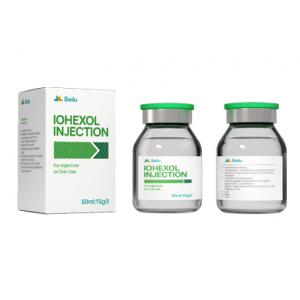Supplier: Beijing Beilu Pharmaceutical Co., Ltd
Contact person: Mr. beilupharma
Position: 101509
Address: No.3 Shuiyuan West Road, Miyun District, Beijing
Country: China
Phone: 010-62622266 - Mobi: 15201108103
Iohexol Injection
Price:
Iohexol Injection is a non-ionic Contrast Media. Compared with a traditional ionic Contrast Media, Iohexol Injection has an excellent molecular structure and it can greatly improve user safety and significantly reduce adverse reactions. The iodinated contrast agent has excellent clinical feedback and good imaging results. In 1998, Iohexol Injection was launched as Beilu's 1st iodinated Contrast Media. If you want to know iohexol injection price, please contact us.
Product name: Iohexol Injection
Generic name: Iohexol Injection
Type: Injectable Contrast Media for CT/X-ray
Ingredients: iohexol 300
Specification:
(1) 20 ml: 6 gI (2) 50 ml: 15 gI
(3) 75 ml: 22.5 gI (4) 100 ml: 30 gI
(5) 20 ml: 7 gI (6) 50 ml: 17.5 gI
(7) 100 ml: 35 gI
Administration: For injection or oral use of iodinated contrast
Adverse reactions: See the details from the package insert
Shelf life: 36 months
Indications of Iohexol Injection
The omnipaque iohexol is an X-ray contrast agent. It can be used for angiocardiography, arteriography, urography, enhanced CT examination inclduing cervical, thoracic and lumbar myelography, CT cisternography following intrathecal injection (i.e., an injection into the subarachnoid space); arthrography, endoscopic retrograde cholangiopancreatography (ERCP), herniography or fistulography, hysterosalpingography, sialography, percutaneous transhepatic cholangiography (PTC), sinography, gastroenterography, T-tube angiography, etc.
Precautions of Iohexol Injection
General precautions for the use of nonionic-monomer contrast agent:
1. Special attention should be paid to patients with allergies, asthma and adverse reactions to iohexol contrast agents. Prophylactic medications such as steroids and H1/H2 histamine receptor antagonists may be considered for these patients.
2. The risk of serious reactions related to this type of CT contrast agent is low. However, oral iodinated contrast agents can provoke anaphylactoid reactions or other allergic reactions. Therefore, first aid measures should be trained in advance, and necessary rescue drugs and devices should be prepared for possible serious reactions.
3. In view of the low accuracy of pre-test in predicting allergic reactions caused by nonionic contrast agents and the possibility that the pre-test itself may lead to serious allergic reactions, it is not recommended to use pretest to predict iodine allergic reactions.
4. Venous access should be kept smooth throughout the X-ray examination.
5. In the in-vitro tests, the effect of nonionic contrast agents on the coagulation system is lighter than that of ionic contrast agents. During angiography, great care should be taken in the intravascular technical procedures, and the catheter should be irrigated with heparinized saline from time to time to reduce the thrombosis and embolism related to the technical procedures.
6. Patients, especially patients with multiple myeloma, diabetes, renal insufficiency, infants and young children, and the elderly, must be appropriately hydrated before and after the use of contrast agent. Electrolyte disturbance and hemodynamic disorders are common in infants (< 1 year old), particularly neonates. Special attention should be paid to patients with serious heart diseases and pulmonary arterial hypertension because they are prone to developing hemodynamic disorders and cardiac rhythm disturbances.
7. Patients with acute encephalopathy, brain tumour or history of epilepsy should be prevented from seizures, and special attention should be paid to them. The risks of seizures and neurologic reactions are significantly increased in patients with alcohol or drug abuse. Transient hearing loss or deafness occurs in a few patients after myelography, which is possibly caused by a decrease in CSF pressure after lumbar puncture.
8. In view of the high risks of acute renal failure after the use of contrast agent, special attention should be paid to patients with pre-existing renal impairment and diabetes and patients with atypical globulinemia (multiple myelomatoses and Waldenstrom macroglobulinemia).
9. Preventive actions include:
Identify patients with high-risk factors.
Ensure patients are appropriately hydrated and, if necessary, the infusion may be maintained intravenously prior to examination until the contrast agent is cleared from the kidneys.
Avoid any nephrotoxic agent, oral gallbladder contrast agent, surgery for arterial occlusion, renal angioplasty or other major surgeries that increase the renal burden until the contrast agent is cleared.
Repeat radiographic testing is delayed until renal function returned to the pre-examination level.
To prevent lactic acidosis, the level of serum creatinine must be determined before intravascular injection of iodinated contrast agent into diabetic patients taking metformin. For patients with abnormal serum creatinine/renal function, metformin must be discontinued and the examinations with contrast agent must be postponed until after 48 hours of discontinuation. Metformin should be reused only after renal function and serum creatinine level are constant. In some emergency cases of patients with abnormal or unknown renal function, the physician must assess both advantages and disadvantages of using contrast agent and take precautions, such as discontinuation of metformin, adequate hydration of patients, testing of renal functions, and careful observation of symptoms of lactic acidosis.
There is a potential risk of transient hepatic dysfunction. Special attention should be paid to patients with serious hepatic and renal insufficiency due to significantly longer time to clear contrast agent. Hemodialysis patients may receive the examinations with contrast agents. Immediate hemodialysis is not necessary after the injection of contrast agent because there is no evidence showing that hemod.
Founded in 1992, Beilu Pharma is mainly engaged in the research & development, production and sales of pharmaceutical products. It is high-tech innovation company with core competence in the mri contrast media domestic. Beilu provides complete Contrast Media products suitable for X-Ray and Magnetic Resonance Imaging (MRI), and it is the leading manufacturer in the Contrast Media field in China.
SEND INQUIRY
Please fill in fully your information to send email
CATEGORY














 Agriculture
Agriculture